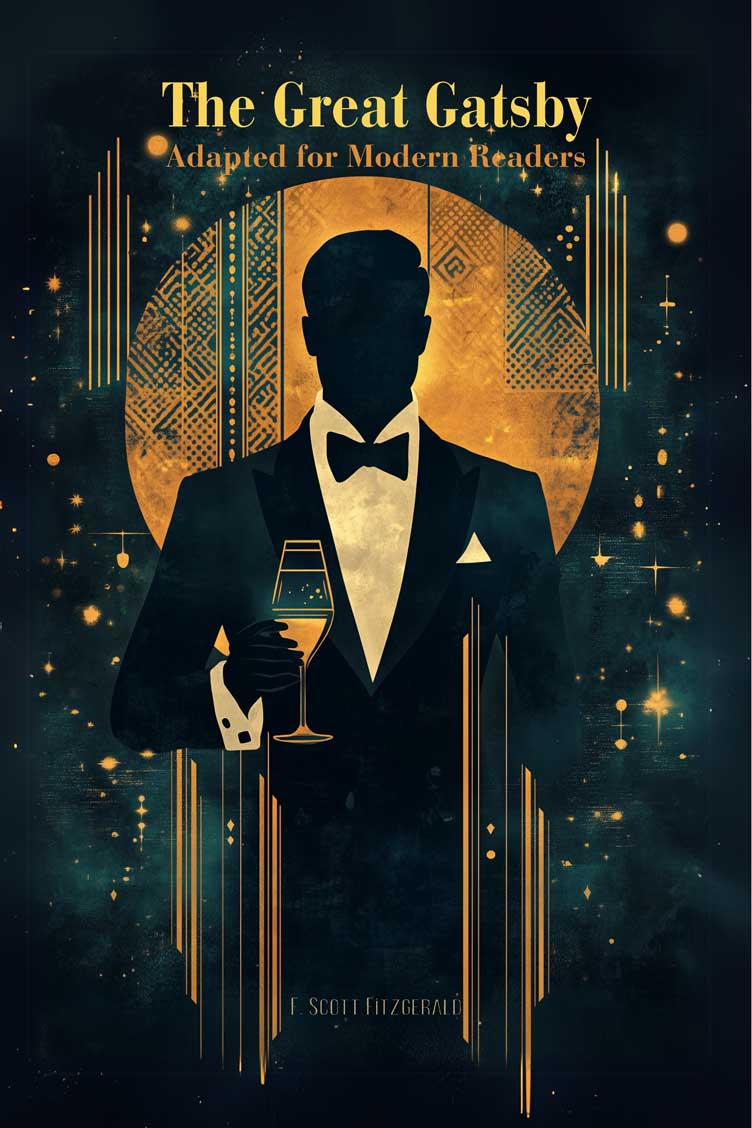Back to Classic Adaptations Purchase on Amazon
Purchase on Amazon

The Great Gatsby
Adapted for Modern Readers
Classic Adaptation
5.0
THIS EDITION of The Great Gatsby not only preserves the charm and elegance of F. Scott Fitzgerald's classic tale but also carefully adapts the language for today's readers. By modernizing vocabulary and clarifying cultural references, this version remains faithful to the original story while making it accessible and engaging for a new generation. Perfect for casual reading, book clubs, educational use, or family discussions, this adaptation offers a fresh take on a timeless masterpiece.
Step into the opulent world of Jay Gatsby and the Jazz Age, where ambition, love, and the American Dream collide in a tale of glamour, longing, and heartbreak. From Gatsby's glittering parties to the poignant unraveling of his dreams, this enduring classic continues to captivate readers with its exploration of wealth, identity, and the pursuit of happiness. This adaptation invites modern readers to experience the beauty and depth of The Great Gatsby in a way that is both approachable and unforgettable.
Sample Comparison
Original
And, after boasting this way of my tolerance, I come to the admission that it has a limit. Conduct may be founded on the hard rock or the wet marshes, but after a certain point I don't care what it's founded on. When I came back from the East last autumn I felt that I wanted the world to be in uniform and at a sort of moral attention forever; I wanted no more riotous excursions with privileged glimpses into the human heart. Only Gatsby, the man who gives his name to this book, was exempt from my reaction - Gatsby, who represented everything for which I have an unaffected scorn. If personality is an unbroken series of successful gestures, then there was something gorgeous about him, some heightened sensitivity to the promises of life, as if he were related to one of those intricate machines that register earthquakes ten thousand miles away. This responsiveness had nothing to do with that flabby impressionability which is dignified under the name of the "creative temperament" - it was an extraordinary gift for hope, a romantic readiness such as I have never found in any other person and which it is not likely I shall ever find again. No - Gatsby turned out all right at the end; it is what preyed on Gatsby, what foul dust floated in the wake of his dreams that temporarily closed out my interest in the abortive sorrows and short-winded elations of men.
Adapted
And after boasting about my tolerance, I must admit that it has its limits. People's actions can be based on solid ground or shaky foundations, but beyond a certain point, I don't care what they're based on. When I returned from the East last autumn, I wanted everything to be orderly and morally upright; I was tired of chaotic adventures and fleeting insights into people's hearts. Only Gatsby, the man this story is named after, escaped my disappointment - Gatsby represented everything I naturally looked down on. If personality is a series of successful actions, then there was something magnificent about him, a heightened awareness of life's possibilities, as if he were like a sensitive instrument that could detect distant tremors. This sensitivity wasn't the same as the weak impressionability often called "creative temperament" - it was an extraordinary gift for hope, a romantic readiness I had never seen in anyone else and probably never will again.
About the Author

F. Scott Fitzgerald
F. Scott Fitzgerald (1896-1940) was a celebrated American author, best known for his iconic novel The Great Gatsby, which is widely regarded as a masterpiece of 20th-century literature. Fitzgerald's work captures the spirit of the Jazz Age, exploring themes of ambition, love, and the American Dream.